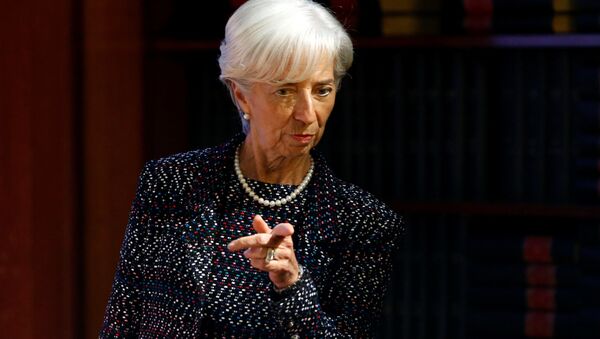Kristian Rouz — Managing Director of the International Monetary Fund (IMF) Christine Lagarde says heightened volatility in international financial markets does not pose a significant challenge in the current macroeconomic environment.
She cited the accelerating GDP growth across advanced economies and select emerging markets — as well as the rising employment and ongoing normalization in monetary policies — as main reasons for a modestly optimistic outlook.
At the same time, Lagarde called for more effective regulation and oversight of financial markets, which could help prevent wild swings in stock valuations and bond yields in the future.
"We need to move to regulations of activities not entities because it's not going to be about the banks and it's not going to be about the insurance," Lagarde said. "We have to anticipate where the next crisis will come from. Will it be the shadow banking? Will it be cryptocurrencies rising to the sky?"
The IMF chief made her remarks at the World Government Summit in Dubai Sunday. The event is a conference of top international business executives and policymakers.
The IMF chief’s comments come after US stocks recorded their largest slump in history last week following a power transition at the Federal Reserve – with President Trump’s appointee Jerome Powell taking over as the new Fed Chair.
US shares rebounded subsequently due to the strong US macro fundamentals and amidst the anticipation of the Trump administration’s fiscal stimulus. However, the sharp selloff in stocks rendered some investors more cautious, whilst the expectations of stock market volatility in the near future somewhat impair the outlook on US domestic investment and GDP growth.
“Asset prices have gone up massively, durable and we all agreed at the time that there had to be a market correction,” Lagarde said regarding last week’s tumble in US stocks.
US shares ended the week moving up sharply, but are still 5.2 percent lower than during the week preceding the slump.
“I‘m reasonably optimistic because of the landscape we have at the moment. But we cannot sit back and wait for growth to continue as normal,” Lagarde added.
She called for a regulatory reform, which would curb malicious and reckless financial market practices, including spoofing and other forms of speculative activity. Lagarde also reiterated the IMF’s global GDP growth outlook remains solid at 3.9 percent for this year and is set to remain at the same pace in 2019.
This, the IMF chief stressed, opens an opportunity for a financial supervision reform, as policymakers are currently able to focus on the longer-term structural issues that need to be addressed rather than fighting more urgent short-term challenges.
"I‘m ringing not the alarm signal, but the strong encouragement and warning signal," Lagarde said.
However, she did not provide any specific details or guidance on what the necessary reforms should look like.
READ MORE: Expert Explains What Led to US Stock Market Plunge
Meanwhile, US stocks remain expensive and investors are concerned that the new Fed Chairman Powell could take a more aggressive approach to policy normalization. This would mean a quicker pace of interest rate increases, as well as sooner cuts to the bloated $4.5-trillion Fed balance sheet.
Powell previously said the balance sheet could go down to $2 trillion during the current normalization cycle, which would mean a gradual selloff of $2.5-trillion worth of US bonds — producing a substantial increase in Treasury yields and pushing the US interest rate up.
Still, Lagarde pointed out, the accelerating economic growth and rising employment would also push wages up — as well as inflation.
This could offset the potential threats to financial stability entailed by the Fed's aggressive policy normalization.



